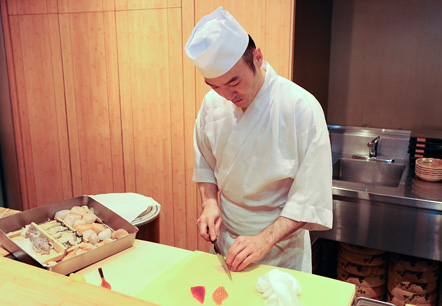Economy
Fresh food off the menu
By Frederik Balfour (China Daily)
Updated: 2011-03-19 09:47
 |
Large Medium Small |
|
 |
|
Mitsuru Tamura prepares sushi at Sushi Yasuda in New York. The US Food and Drug Administration is monitoring Japanese food for contamination. [Photo / Agencies] |
HONG KONG - Sushi restaurants are dropping Japanese fresh food from their menus as a radiation plume released by a damaged nuclear plant in the country heightens fears over possible radioactive contamination.
"Our guests' safety is our top priority," said Sari Yong, a spokeswoman for Shangri-La Asia Ltd, the region's biggest luxury hotel company by market value with 71 locations worldwide. "As a precaution, we have temporarily stopped importing fresh food from Japan."
The Mandarin Oriental International Ltd's flagship in Hong Kong and the city's Four Seasons Hotel have stopped buying food from Japan even as experts say the health risks haven't been established. The US and UK governments were among those to advise their citizens to consider leaving Japan on concerns that the authorities were losing the battle to contain leaks from the quake-stricken nuclear plant north of Tokyo.
"Until the situation stabilizes in the country, it seems unlikely that guests will feel comfortable consuming Japanese produce," said Sally De Souza, public relations manager for the Mandarin Oriental hotel group.
Concerns about radiation levels in food have prompted South Korea, Indonesia, Thailand, Malaysia, India, Singapore and the Philippines to screen food imports from Japan. The US Food and Drug Administration is monitoring Japanese food for contamination and weighing steps that "may include increased and targeted product sampling", it said.
The reluctance to buy seafood from Japan is affecting the nation's fish traders, who are already suffering from the damage caused by the earthquake and ensuing tsunami.
"We are not selling anything because there are no customers," says Kengo Kumamoto, a worker at the wholesaler Miyake Fisheries at the Tsukiji Market in Tokyo.
Sushi bars in Tokyo are also suffering. The normally busy Tsukiji Sushi Ichiban restaurant, located next to the wholesale fish market, was empty on Thursday afternoon.
"We had a lot of customers until last Friday," said sushi chef, Shinichi Niiyama "Sales are really falling, we've probably lost about 70 percent, and a lot of it is from the lack of tourists."
The Four Seasons Hotels Inc's Hong Kong hotel suspended all imports of Japanese food, including Wagyu beef, sea scallops and abalone, and substituted them with products from New Zealand and Australia, Claire Blackshaw, director of public relations, said on Thursday.
London's Zuma and Roka restaurants have stopped buying fresh food directly from Japan.
Bloomberg News
| 分享按钮 |



